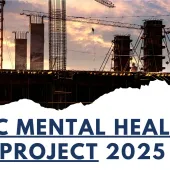Nurturing mental wellbeing: a crucial aspect of Christmas in the construction sector
The holiday season is usually associated with joy, festivities, and quality time spent with loved ones. However, for many people working in the construction sector, the Christmas period can be accompanied by unique challenges that may impact their mental health. It’s crucial to shed light on the significance of mental wellbeing during this time and to offer practical advice for those who may be facing challenges.
The construction industry, renowned for its resilience and hardworking professionals, faces a hidden crisis: mental health issues. According to data from the UK Health and Safety Executive (HSE), a staggering number of workdays are lost each year in the construction sector due to mental health-related problems. The demanding nature of the job, long working hours, and the physical strain involved can take a toll on workers, affecting their mental health.
And Christmas, a time traditionally associated with joy, can exacerbate existing mental health challenges for those in the construction sector. The pressure to meet deadlines, uncertainty about job security, and, for many, the prospect of spending the holidays away from family can contribute to heightened stress levels. Unfortunately, this stress can sometimes lead to tragic outcomes, with an alarming number of suicides reported in the UK construction industry, particularly during the Christmas season.
It's crucial employers and colleagues are vigilant and supportive during this period. The HSE emphasises the importance of creating a positive and inclusive work environment that prioritises mental health. Employers can play a key role in fostering an open culture where individuals feel comfortable discussing their mental health concerns without fear of stigma or discrimination.
Practical advice for identifying and assisting those who may be suffering from mental health problems includes:
Observation and communication: Pay attention to changes in behavior, mood swings, or withdrawal from social activities. Encourage open communication, allowing individuals to express their feelings without judgment.
Training and awareness: Provide mental health awareness training for all staff members, equipping them with the knowledge and tools to identify signs of distress and offer support. This can help create a more empathetic workplace culture.
Access to support services: Ensure that employees have access to confidential support services, such as employee assistance programs or counseling services. Having professional help available can make a significant difference.
Work-life balance: Encourage a healthy work-life balance, especially during the holiday season. Consider flexible working arrangements, if possible, and actively discourage excessive overtime.
In the words of the HSE, "Taking care of mental health is not just a personal responsibility; it's everyone's responsibility." By fostering a workplace that values mental wellbeing, we can contribute to reducing the alarming statistics surrounding mental health issues in the construction sector, especially during the challenging Christmas period.
This Christmas, let’s come together as an industry to support one another, ensuring that the well-being of our colleagues remains a top priority. After all, a mentally healthy workforce is the foundation for a thriving and sustainable construction sector.
Enjoy your holiday. Stay safe. Check in on a friend.








Good mental health is a state of well-being where you feel good and can function well. You can cope with normal stresses, work productively, and feel satisfied with life.
A mental disorder . . .
IS NOT the result of personal weakness.
IS a medical condition that causes significant distress and disrupts a person’s thinking, emotional control, and behavior.
Can often upset a person’s ability to relate to others and to handle the daily demands of life.
Can affect people of any age, culture, race, tribe, religion, educational background, or income level.
- Reply
Permalink